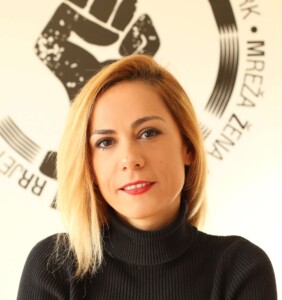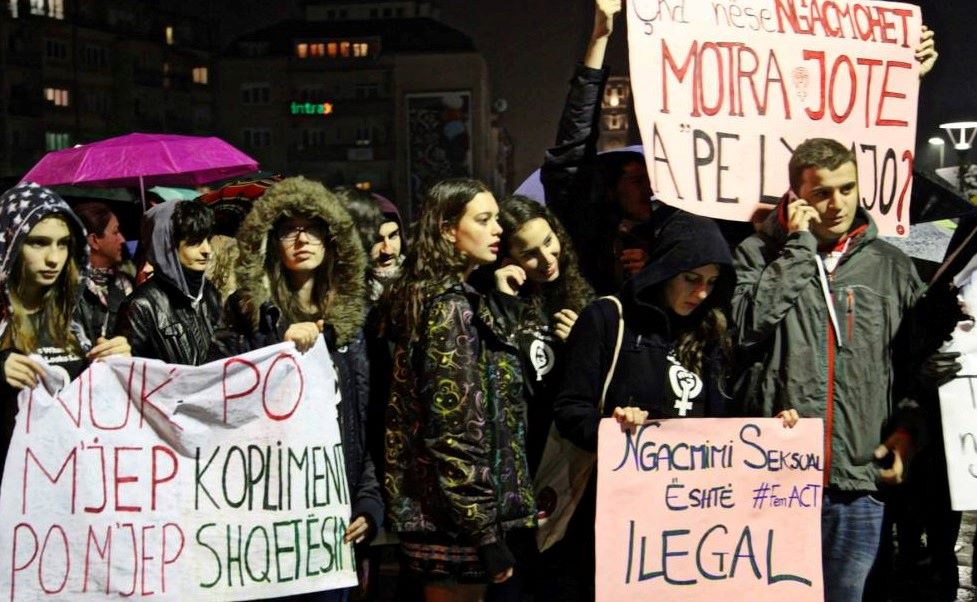In 2016, Kosovo Women’s Network launched the first rapport ever made in Kosovo, which evaluated that around 48.5% of Kosovars have experienced sexual harassment, while around 64% of the women in Kosovo have experienced sexual harassment for their whole lives.

Adelina Berisha
In December 2014 in Kosovo it was organized the first street reaction “Take Back the Night”, where the youth and human rights activists gathered together and through marching and cheers protested against sexual harassment. The event was organized by Kosovo Women’s Network within the meeting that KWN had with Kosovar girls which expressed that sexual harassment is one of the major issues that threatens their security. Until then, sexual harassment as a form of gender violence was a taboo topic in the Kosovar society and it was discussed only among girlfriends who used to express their worries about their experiences of sexual harassment. In the public space it was not discussed at all about this issue that affected the lives of women and girls in Kosovo.
In 2016, KWN launched the first rapport ever made in Kosovo, which evaluated that around 48.5% of Kosovars have experienced sexual harassment, while around 64% of the women in Kosovo have experienced sexual harassment for their whole lives. In general, the girls and women who were part of this research, declared that they did not report the harassment to none of the institutions. In 2015, KWN found out that only 4.1% of the respondents have reported the sexual harassment to the authorities, or they knew someone who did so. The culture of “victim blaming” in cases where there is sexual harassment it is widely accepted, and 74% of Kosovars believe that “women make the problems for themselves by dressing and behaving on provocative ways”. Almost one-third of the Kosovars believe that people harass others when they are attracted by them and that this kind of behavior is acceptable. More men (35.4%) than women (26.9%) agree with the opinion that this behavior is not a problem (it is alright). Further, an opinion that the young women like it when they are harassed is widely present among both men and women (40.5%).
Very few citizens had knowledge about what is sexual harassment. This is maybe due to the fact that until 2019 sexual harassment was not a criminal act. In the Kosovar legislation, in the civil procedures, sexual harassment is defined by the Law for Gender Equality and Law for Protection Against Discrimination. Since 2019 it is a criminal act, in the article 183 which defines sexual harassment as “Sexual harassment is any form of unwanted verbal, non-verbal or physical behavior of a sexual nature, aimed at violating the dignity of a person, and creates an environment which is objectively intimidating, hostile, degrading or humiliating”, and the punishment for this sexual harassment varies from fines to 5 years of imprisonment.
Sexual harassment has different consequences for the victims, emotional consequences – guilt, loss of self-esteem, fear. Sexual harassment also affects the women’s approach to the public sphere, affecting this approach to be minimized and dangerous for women. Sexual harassment has affected many women to lose their jobs or their interests for working because of the fear of experiencing sexual harassment, because of the lack of policies that fight sexual harassment in public institutions, but also in those private, policies that would facilitate the reporting process of sexual harassment.
Since September, Kosovo is committed to implement Istanbul’s Convention, making it part of its Constitutions. This convention, among others, requires from the countries to prevent the violence against women, including sexual harassment.
Adelina Berisha, Program manager against gender violence Kosovo Women’s Network



Leave A Comment